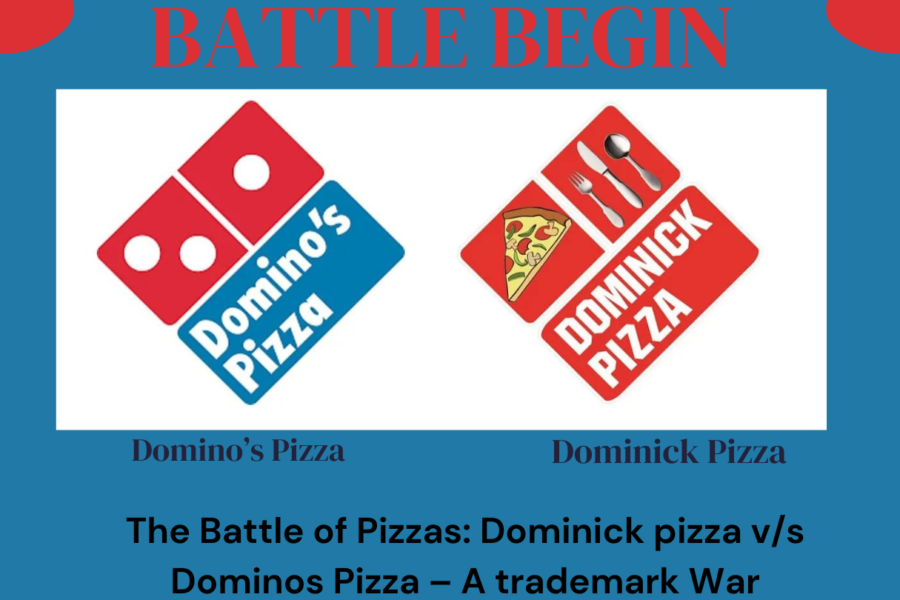In the ever-expanding world of global brands and fierce competition, the protection of intellectual property rights has become the utmost concern. The case of Dominick Pizza vs. Dominos Pizza unfolded as a testament to the importance of safeguarding trademarks and the legal battles that can ensue when these rights are infringed upon.
The Clash of the Titans
Domino’s Pizza, a renowned global pizza giant, and Dominick Pizza, a local pizzeria, found themselves embroiled in a legal tussle that would test the boundaries of trademark protection. The conflicts arose when Domino’s Pizza, the well-established international chain, took issue with the alleged similarity between their registered TM and the name “Dominick Pizza.”
Section 29 of the Trade Mark Act, 1999 :
The Cornerstone of Trademark Protection At the heart of this case lays Section 29 of the Trade Mark Act, 1999, which outlines the exclusive rights conferred upon registered trademark owners. This section grants trademark holders the right to prevent unauthorized use of their marks or any similar marks that may cause confusion or deception among consumers.
Domino’s Pizza, relying on the provision of Section 29, argued that the name “Dominick Pizza” was deceptively similar to their registered trade mark and could mislead consumers into believing there was an association between the two businesses. This alleged infringement, they contended, could dilute their brand’s reputation and cause irreparable harm.
The Defense of Dominick Pizza:
Dominick Pizza, the local pizzeria, mounted a defence rooted in the principles of fair competition and the right to conduct business without undue interference. They contended that their establishment was a small, independent venture operation in a limited geographical area, posing no real threat to the global dominance of Domino’s Pizza.
Furthermore, Dominick Pizza argued that the alleged similarity in the name was coincidental and not intentionally designed to mislead or capitalize on the goodwill of Domino’s brand. They maintained that consumers were capable of distinguishing between the two entities and that no actual confusion had occurred.
The Court’s Interpretation :
Balancing Trademark protection and fair competition, as the case made its way through the legal system, the courts were tasked with striking a delicate balance between protecting the legitimate rights of trademark owners and ensuring fair competition in the marketplace. The crux of the matter centred on determining whether the name “Dominick Pizza” constituted a genuine infringement of the Domino’s Pizza trademark or merely a coincidental similarity.
In their analysis, the courts delved into the factors outlined in section 29(3) of the Trade Mark Act, 1999, which provides guidelines for assessing the likelihood of confusion or deception. These factors include the similarity of goods or services, the strength and reputation of the trademark, the geographical area of operations, and the potential impact on the trademark owner’s business interests.
The Landmark Ruling :
After careful consideration of the arguments presented by both parties and an in-depth examination of the relevant provisions of the Trade Mark Act, of 1999, the court delivered its landmark ruling as
The court acknowledged the global reputation and strength of the Domino’s Pizza trademark but also recognized the need to balance trademark protection with the principle of fair competition. It concluded that while there existed a degree of similarity between the names, the limited geographical scope of Dominick Pizza’s operation and the absence of evidence suggesting actual consumer confusion mitigated the risk of infringement.
The court’s ruling established several precedents for future trademark disputes, highlighting the importance of considering factors such as the geographical area of operations, the size and scope of the businesses involved, and the likelihood of genuine consumer confusion. It reinforced the principle that trademark protection should not be absolute, but rather balanced against the rights of others to conduct legitimate business activities without undue interference.
Implications and lessons learned :
The Dominick Pizza & Domino’s case had far-reaching implications for trademark law in India and served as a learning opportunity for businesses, legal professionals, and policymakers alike.
For businesses, the case underscored the importance of conducting thorough trademark research and exercising due diligence when selecting brand names or trademarks. It highlighted the need to strike a balance between protecting one’s intellectual property rights and respecting the rights of others to operate in the same market.
For legal professionals and policymakers, the case shed light on the nuances of interpreting and applying the provisions of the Trade Mark Act, of 1999. It highlighted the need for a nuanced approach that considers the specific circumstances of each case, rather than adopting a one-size-fits-all approach to trademark infringement claims.
Moreover, the case sparked discussions on the potential need for further clarification or amendments to the Trade Mark Act, of 1999, to provide greater guidance on resolving conflicts between established brands and local businesses operating in limited geographical areas.
Conclusion;
The case of Dominick Pizza v. Domino’s Pizza serves as a reminder of the delicate balance that must be struck between protecting the legitimate rights of trademark owners and fostering a competitive business environment. It underscores the importance of a nuanced and contextual approach to trademark disputes, one that considers the specific circumstances of each case and seeks to uphold the principles of fair competition and consumer protection.
As the business landscape continues to evolve and new challenges emerge, the lessons learned from the case will guide future legal interpretation and policy decisions. It will serve as a touchstone for striking the right balance between intellectual property protection and the promotion of a thriving, competitive marketplace, where innovation and consumer interests remain at the forefront.
contributed by : Devesh Modi
ICFAI Law School (2022-2025)

